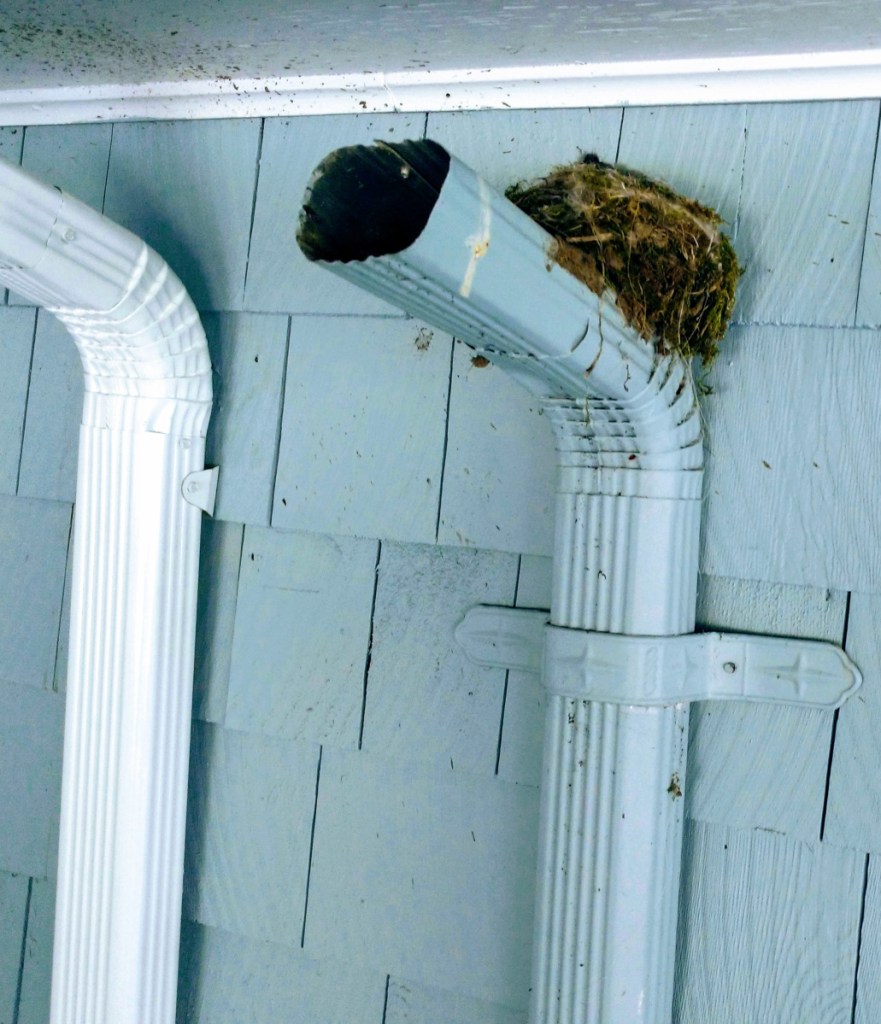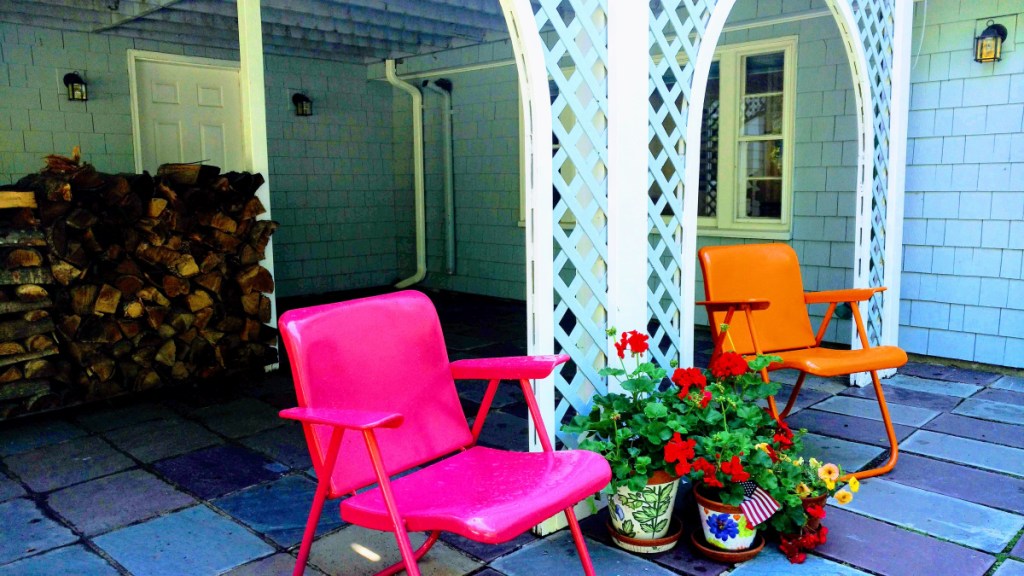The roofers weren’t the problem – it was the new downspout they were supposed to install as part of the project. Nestled between the elbow of the old downspout and the soffit board under the eaves beneath the deck was a lovely birds’ nest built by an industrious Mrs. Hermit Thrush. This beautiful creation of bright green moss and twigs with a cozy soft fur cushion was her second of the season, and when it was finally our turn to get a new roof and gutters, the nest was full of chicks.
How do I know it was the mother bird who built the nest? I read it in the “National Audubon Society Field Guide to North American Birds” when I decided that our goal this summer is to learn more about birds. I needed to share only one shocking discovery with my husband to get him on board: It’s not the Eastern phoebe that sings that familiar song in the spring that we love and reminds us of our delightful niece Phoebe, but the black-capped chickadee – Maine’s state bird.
I mean, how risky can beginner birding be, right? Before dinner you sit on the deck with a little green vinyl book and a glass of wine and look around. There’s a good index in these sturdy field guides that I like and nice photos on thick shiny paper. As luck would have it, we had two of these little books already sitting on the shelf, so the entrance cost of the particular hobby was low and a selling point. Learning new things keeps minds sharp and relationships fresh, according to reports.
When, shortly after construction of the first nest on the downspout began, it then quickly and neatly disappeared, I knew exactly what had happened and why. We’ve been married a long time. It was a bump in the road – a challenge to our otherwise-frivolous new pastime.
I tried to suppress the inexplicable feelings of attachment I had to an unfinished birds’ nest and said, at first, that I agree: Birds’ nests are messy – especially when they are located over flagstones and near the house. Then I added I was a little sad that my husband had cleared the nest without even discussing it. Hearing baby birds sing from under the deck was something I was really looking forward to, and the location seems perfect for a nice, safe little nest, I added. At least I got the satisfaction of knowing the mother bird had used some of the yellow dog hair building the nest that I had left for that purpose in the forsythia bush after brushing our Lab, Marley, I mentioned.
At that point, we both felt bad.
The next day Mr. and Mrs. Hermit Thrush got to work and started nest No. 2 without missing a beat – she doing the construction while he flew around and sang songs. I read this in my field guide. “The male Hermit Thrush defends the nesting territory by singing, especially in morning and evening,” it says, and a singing defense is another thing I like about birds.
The second nest went up quickly in the same spot on the same downspout, but this time Marley’s fur played a more pronounced role in the overall design – shaped and woven like a puffy maize-colored comforter. It was as if Mrs. Thrush went out of her way to validate me and my ideas.
The birds gave us a second chance, and we nurtured the new nest from the safe distance of the deck above it in the evenings with our little green books and tinkling glasses and binoculars. We salvaged our fledgling hobby and our birds appeared to be very comfortable. I was happy to be meeting our goal – until word from the roofers came that the nest on the downspout had to go.
How about relocation to the Audubon Society in Falmouth? I suggested, half-heartedly and without confidence. Shouldn’t we put the chicks in a shoebox or something and feed them with droppers? Or is that like separating kids from their parents? Putting a nest full of chicks in the woods behind our house or in a bush someplace would certainly please our resident hawk and any number of other critters lurking around the jungle of Cape Elizabeth at night. It was a bleak realization. The party was over.
During coffee on the morning the roofers were scheduled to arrive, there was a weighted silence at the table and as if on cue, a cold fog rolled in. After staring out the window while I pretended to read the paper, Tom went to the basement and got some tools. Then he went outside and moved the section of old downspout – with the nest balancing on its elbow – about 12 inches to the right and secured it there with aluminum straps, ever so carefully, without touching the nest, he said.
Newly positioned, the nest is still tucked under the eaves where now we have parallel downspouts – the new one connected to the gutter system to collect rainwater and the old one holding up the nest with the chicks in it that’s connected to us.
Roofers do not have twinkle toes, and our house is a rambling ranch with a lot of roof. For two straight long days, an army of men with hammers and pickaxes and staple guns and shovels attacked our moldy old roof. There were several big trucks and generators and pulleys and ladders. It was a war zone – and the night after the roofers left, it thundered and there was lightning and a violent downpour.
The next morning the sun was out, the air was cool and crisp and I was alone. With trepidation I forced myself to look under the deck to give my imagination a rest. The new downspout and the nest on the old downspout next to it survived the storm. A fuzzy little head with a beak was bobbing, but my joy was quickly met with angst. What if Mr. and Mrs. Hermit Thrush have abandoned the nest because of all the commotion and relocation? Who could blame them. What then? Should we tell the kids? Maybe removing the nest in the first place wasn’t such a bad idea.
As of this writing, the fate of the hermit thrush family that took up residence on our downspout under our deck is still unknown. The mother bird was spotted in the nest and our hopes soared, but the chicks seem listless, so we worry. They’ve been through so much. And so have we.
Cynthia Dill is a civil rights lawyer and former state senator. She may be contacted at her website:
Copy the Story LinkSend questions/comments to the editors.




Success. Please wait for the page to reload. If the page does not reload within 5 seconds, please refresh the page.
Enter your email and password to access comments.
Hi, to comment on stories you must . This profile is in addition to your subscription and website login.
Already have a commenting profile? .
Invalid username/password.
Please check your email to confirm and complete your registration.
Only subscribers are eligible to post comments. Please subscribe or login first for digital access. Here’s why.
Use the form below to reset your password. When you've submitted your account email, we will send an email with a reset code.